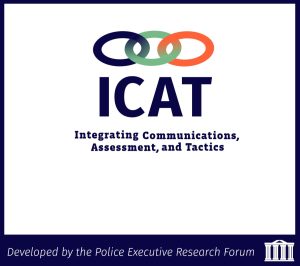ICAT: Integrating Communication Assessment and Tactics

ICAT—Integrating Communication Assessment and Tactics—will be offered October 12-13 at the Criminal Justice Institute in Little Rock.
Created by the Police Executive Research Forum (PERF), a research organization in Washington, DC, this training program is designed especially for situations involving persons who are unarmed or are armed with weapons other than firearms, and who may be experiencing a mental health or other crisis.
ICAT Testimonial
The integration of ICAT. Training (Integrating Communication, Assessment, and Tactics) at the Fort Smith Police Department has had a remarkable impact on our officers and their ability to effectively respond to volatile situations. This training has proven to be an invaluable resource in reducing the use of force, enhancing de-escalation techniques, and improving crisis intervention.
ICAT Training has equipped our officers with a comprehensive set of tools and strategies to safely and effectively mitigate potentially dangerous encounters with the public. The emphasis on enhancing both officer safety and the safety of the individuals they encounter is at the core of this training program. Our experience with ICAT has yielded substantial benefits, and I would like to highlight some key aspects of its effectiveness.
First and foremost, ICAT’s foundation in tactics and skills for de-escalation has been transformative for our officers. The ability to defuse tense situations and prevent them from escalating into violent confrontations is paramount in modern law enforcement. ICAT has provided our officers with a nuanced understanding of communication techniques that foster cooperation, empathy, and understanding during interactions with citizens, particularly in high-stress and potentially volatile situations.
Furthermore, the utilization of the Critical Decision-Making (CDM) Model within the ICAT framework has been instrumental in helping our officers make sound, safe, and effective decisions in real-time scenarios. The CDM Model’s systematic approach to assessing situations, coupled with its focus on documenting and learning from actions taken, has elevated our officers’ capacity to exercise better judgment under pressure. This has, in turn, contributed to a notable reduction in the instances where force may have otherwise been required.
In addition to its practical benefits, ICAT Training has also improved the public’s perception of our agency. The community has recognized our commitment to enhancing the safety of all individuals and the importance we place on de-escalation and crisis intervention. This has resulted in improved community relations and a more positive interaction between our officers and the citizens they serve.
Through our ICAT Training, another key point is the recognition of a crisis. We were so pleased with the results of this training for our officers that we’ve actually implemented the training into our communications center. All dispatchers have attended ICAT Training to help improve in their daily interactions with our community members and improve upon their active listening skills. This training has also assisted our dispatchers in the early recognition of a crisis to help better prepare our officers in their response for a peaceful resolution through recognition and communication with our officers.
In conclusion, I cannot overstate the profound impact that ICAT Training has had on our police agency. It has fundamentally altered the way we approach our duties, placing a heightened focus on de-escalation, crisis intervention, and the safety of all parties involved. Our officers are now better equipped to navigate challenging situations, make informed decisions, and build stronger connections within our community.
We, are deeply grateful for the comprehensive and effective training provided by ICAT, and we wholeheartedly endorse its continued use within law enforcement agencies seeking to enhance their officer safety and the safety of their communities.
Lieutenant Lee McCabe
Fort Smith Police Department
Officers taking this course will:
- Develop a comprehensive understanding of the principles and tactics of ICAT, including the use of communication skills, cover and concealment, and coordinated response strategies, to effectively resolve critical incidents and reduce the likelihood of injuries or fatalities.
- Apply ICAT principles in real-world scenarios, using practical exercises and simulations to reinforce skills and knowledge, and to develop an understanding of how to effectively communicate with diverse individuals in high-pressure situations.
- Enhance critical decision-making skills, including the ability to quickly assess and analyze situations, and to identify and prioritize potential risks and threats, to enable officers to respond appropriately and safely to critical incidents.
This course is designed for all certified law enforcement officers. ICAT incorporates different skill sets into a unified training approach that emphasizes scenario-based exercises, as well as lecture and case study opportunities.
QUESTIONS? Contact Kimberly Hendricks Jones @ [email protected] or 501-570-8041.
